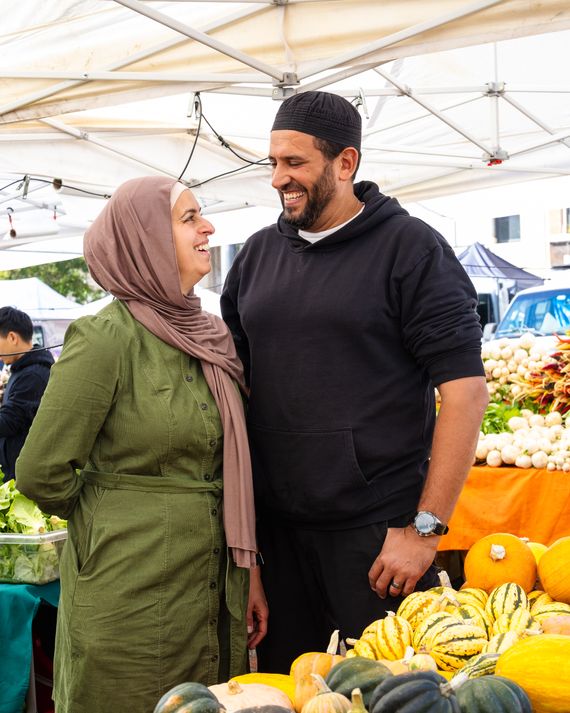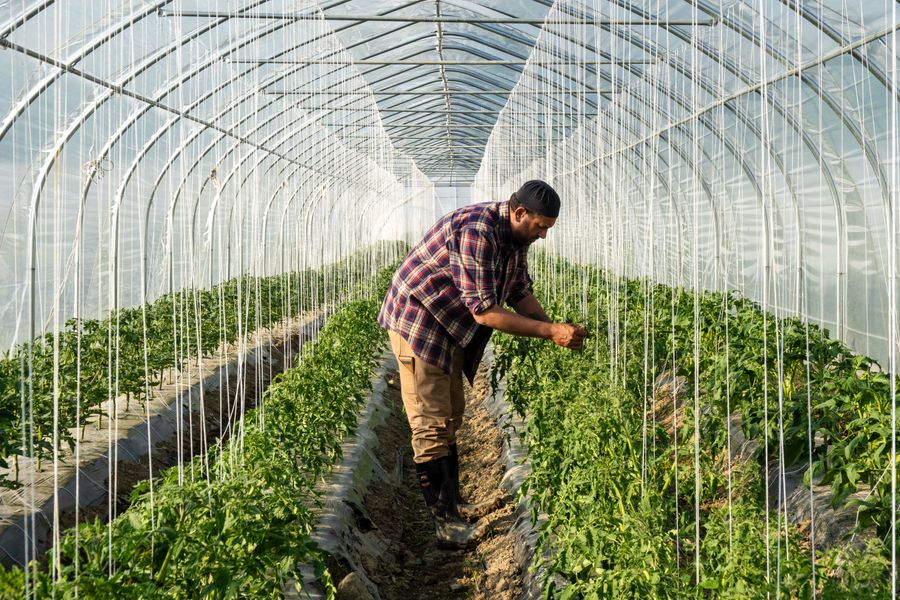Diane Aboushi Saleh at Halal Pastures this week.
Photo: Daleelah Saleh
Step into the sprawling Halal Pastures stand on the primo northern end of Union Square on a Wednesday and it’s like stepping into a whole different Greenmarket. Colorful signs over heaped-high greens and herbs and squash and peppers spell out names, flavors, uses, and prices. Hindi pop or Egyptian oud will be playing over the speakers. The farmers and vendors are wearing kufis and hijabs, winding up and down the aisles to offer samples. Huge posters behind the checkout show literal pastoral scenes. On hot days, shoppers cool off under the mister that keeps three kinds of cilantro and 15 types of lettuces from wilting. It’s like being in a tiny village alongside 17th Street.
While home cooks are picking out ginger and cucamelons to use at home, you’ll hear “Hi, chef — how was Egypt?” “Hi, chef — what did you catch last weekend?” “Hi, chef — how has your kid been acting?” Someone else will enter the stand to explain, “I’m opening a bar with a vegetable-forward menu” and then ask “Do you run accounts?” You notice chefs doing R&D for their upcoming menus, getting their baskets filled by one of the farmers with a mix of ideal greens for a salad they want to make sure is packed with flavor and contrasting textures. You’ll be offered a taste of vibrant arugula or red celery or sweet pepper.
As a 40-something-year devotee of the city’s Greenmarkets, I’ve been fascinated by Halal Pastures ever since it unfurled a small tent on the southwest corner of the square two years ago, and not just because the produce is extraordinary. What struck me was its combination of varied produce with their clear sense of purpose: “Always halal, always organic.” This is still a city, after all, that once tried to shut down a mosque near Ground Zero.
The married farmers behind Halal Pastures, Samer Saleh and Diane Aboushi Saleh, started with just half an acre of land an hour’s drive north of the city in 2015. They’d only intended to grow food for their family but soon expanded into professional farming, even though neither had an agricultural background. Samer is in investment banking and Diane (who grew up as the oldest of ten in a Palestinian family in Sunset Park) is a lawyer. But it turned out that the exacting standards they applied to their own food appeal to seasonally minded pro chefs as well. “We as human beings were meant to be working with our hands, not sitting at a desk behind a computer — it’s very satisfying,” Samer says. But, he adds, “If you’re in it for money, you’re not meant for farming.”
They scored their coveted Union Square Wednesday spot, arriving at 5:15 a.m. and staying until 7 p.m., after another farm “transitioned” out. The timing is important: Norwich Meadows, a 20-year market veteran, also has a huge variety of produce that appeals to chefs, but it’s not at the Wednesday market year-round. (It does sell there on Saturdays, when the market is more like a tourist attraction, according to some chefs.) Halal Pastures also sells on Fridays — typically when restaurant staffs are prepping hard for the weekend — so Wednesdays are for meeting and greeting. Wednesday is the one day of the week that Diane works at the stand, too, since “someone has to be home with the kids.” She is responsible for Halal Pastures’ handmade signs explaining the different products; she started making them because she homeschools her sons, 7-year-old Noah and 6-year-old Salahudeen, and uses them to teach. “If 6-year-olds can get the Scoville scale, anyone can.” (Diane says her Brady Bunch family also comprises their 12-year-old daughter, Malak, plus Samer’s adult son, Yaseen, and daughter, Daleelah, who studied film at Middlebury and runs the farm’s social media.)
“After a couple of years at the Greenmarket, you learn who’s bullshit,” says one chef, who asked to remain nameless for this story. “Diane is not bullshit.”
Diane Aboushi Saleh and Samer Saleh.
Photo: Daleelah Saleh
Another, Ayaka Guido of the just-opened ABC Kitchens in Dumbo, arrived at the stand on a recent Wednesday bearing a tall cup of coffee for Samer. She said she buys from Halal Pastures every week, sometimes with her boss, Jean-Georges Vongerichten. Guido’s opening menu features vibrant greens, especially chards and mustards, along with potatoes and peppers. Winter will be more challenging, but she said she’s looking forward to the squash, cabbages, and potatoes of colder months. “Diane and Samer have such integrity in everything they do, from how they care for their vegetables to how they work with chefs directly,” Guido says. “Their consistency, transparency, and respect for the product are a huge part of why so many of us love working with them.”
Of course, the relationships wouldn’t last if the ingredients weren’t any good. The Salehs made a point to grow the food that chefs want. “Chefs asked us to expand, so we talked to chefs and got a wish list,” Diane says. Zucchini is a particular point of pride this time of year: “Chefs want the tiny ones for a pop of color and concentrated flavor on the plate.” (Robert Duncan, who purveys for Tom Colicchio’s Craft, confirms Diane and Samer’s thesis: “You can get zucchini at any stand, but not this size.”)
Chef Sean Froedtert of Manuela in Soho says the Salehs “came in as outsiders and really pushed with chefs — ‘Try this, try that’ — to establish relationships.” He is one of several chefs who’s been invited to the farm outside Red Rock Tavern to see the fields and greenhouses. With an upstate staff of 25, the Salehs now farm 125 acres, some of that the famously rich black dirt of Orange County, which Samer describes as feeling like “a bowl of compost” but with its challenges. Fresh chickpeas were a failure, for example, but the couple also learned from their mistakes in raising shell beans to sell fresh. They now let them dry and offer ten varieties year-round.
Back at the market, Becky Hodges, a home cook from the West Village, was rather excitedly picking up the blue bag she gets as part of the farm’s weekly CSA offering, checking out the huge sunflower head and assorted produce. “For $35 a week,” she said, “it’s the greatest thing on Earth.”
Samer at his farm.
Photo: Daleelah Saleh

